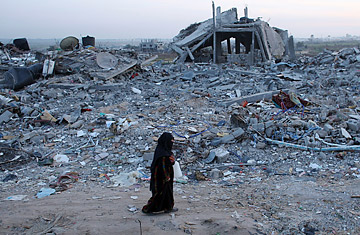
A woman walks through the rubble of homes destroyed by the Israeli offensive in Jabalia, Gaza, on Jan. 20
King Abdullah of Saudi Arabia invited three feuding Arab leaders to a reconciliation lunch this week. The rulers of Syria, Qatar and Egypt, in Kuwait for an economic summit, turned up at King Abdullah's residence in Kuwait City for some Saudi hospitality. But it will take more than meze and grilled lamb to heal the gaping divisions in the Arab world. "If these breaches are so easy to solve by having lunch, then they should be having breakfast, lunch and dinner," said Rami Khouri, director of the Issam Fares Center of Lebanon at the American University of Beirut. As Palestinian survivors of the three-week military onslaught in Gaza scooped out the dead from the rubble, Khouri says the Arab world's squabbling rulers have never looked more "collectively mediocre."
Disputes among Arab leaders are nothing new, and the current rift was evident long before the war in Gaza. But the bloodshed and destruction wrought by Israel's offensive against Hamas has sharpened those differences, and will continue to shape regional dynamics in the months to come. At its most simplistic, the divide pits a so-called moderate camp, backed by the United States and led by Saudi Arabia, Jordan and Egypt, against a "resistance front" group that includes Syria along with powerful political and military movements such as Hamas and Lebanon's Hizballah — all of which oppose Israel and U.S. policy in the Middle East. (See pictures of heartbreak in the Middle East.)
When Israel struck Gaza in December the Arab moderates initially backed Palestinian President Mahmoud Abbas, head of Fatah, while the resisters supported Fatah's bitter rivals, Hamas. Egypt and Saudi Arabia criticized Hamas for triggering the conflict by refusing to extend a six-month cease-fire. But as the death toll climbed and anger rose on the streets of Arab capitals, Saudi Arabia fell silent and Egypt scrambled to find a diplomatic solution.
That left an opening for Hamas' supporters. On Jan. 16, as the Israeli assault on Gaza still raged, Qatar, which has forged a role as regional mediator by deftly balancing relations with Syria and Iran as well as the U.S., stepped in to host a summit. Saudi Arabia, which resents being upstaged by its tiny neighbor, refused to attend. Egypt and Jordan stayed away too, ensuring that most of the participants were firmly in the Hamas camp.
At the summit, Syrian President Bashar Assad demanded the scrapping of the Arab peace initiative, a seven-year-old Saudi plan that offers collective Arab recognition of Israel in exchange for the return of occupied territory and the establishment of a Palestinian state. Assad's call was intended to signal anger toward Israel, but it also served as a swipe at the Saudi architects of the initiative, with whom he is feuding.
With the conflict over, at least for now, the squabbling between Arab capitals continues. Pointing to the 1,300 Palestinians killed and $2 billion worth of damage to homes and infrastructure, Hamas' allies say the camp of Arab moderates has been thoroughly discredited. Calls for peace with Israel have never sounded so hollow, they say. "The settlement process [between Arabs and Israel] is gone," Nawaf Mussawi, Hizballah's chief of international relations, told TIME. "The resistance [against Israel] has become the mecca of everyone in the region." (See pictures of Israel's deadly assault on Gaza.)
In an apparent nod to that sentiment, King Abdullah struck a conciliatory note on Monday when he told the Kuwait summit that the Arab peace initiative, his own brainchild, could be withdrawn, a shift that indicates the moderates may be losing the argument. "Israel has to understand that the choice between war and peace will not always stay open and that the Arab peace initiative that is on the table today will not stay on the table," he said.
Abdullah blamed Israel for the Gaza crisis and pledged $1 billion in reconstruction aid. The fence-mending lunch followed, but it didn't get very far. While Saudi supporters hailed the reconciliation bid as "historic," the Arab media noted that the atmosphere at the table between Assad of Syria and President Hosni Mubarak of Egypt remained "cold," with the latter leaving early to return to Cairo. In a speech before the lunch, Mubarak had delivered a veiled jab at Syria's close ties to Iran, spelling out the suspicions of some Arab countries about the Persian state's influence in the Middle East. "It's regrettable that we allow the ambitions of foreign forces to impose their hegemony on the area, to penetrate our Arab world and trade with the blood of Palestinian souls," he said.
Iran is central to the regional polarization because of its alliance with Syria and backing for Hizballah and Hamas, which the rival moderate camp interprets as Persian meddling in Arab affairs at its expense. "In the past, the Arabs showed their disagreements by closing borders, interrupting trade and massing troops on borders. Today, they use handshakes and lunches to put a civil face on their disagreements," said Mustafa Hamani, chairman of Jordan's weekly newspaper Al-Sijill. "But the Arab rift always remains."
